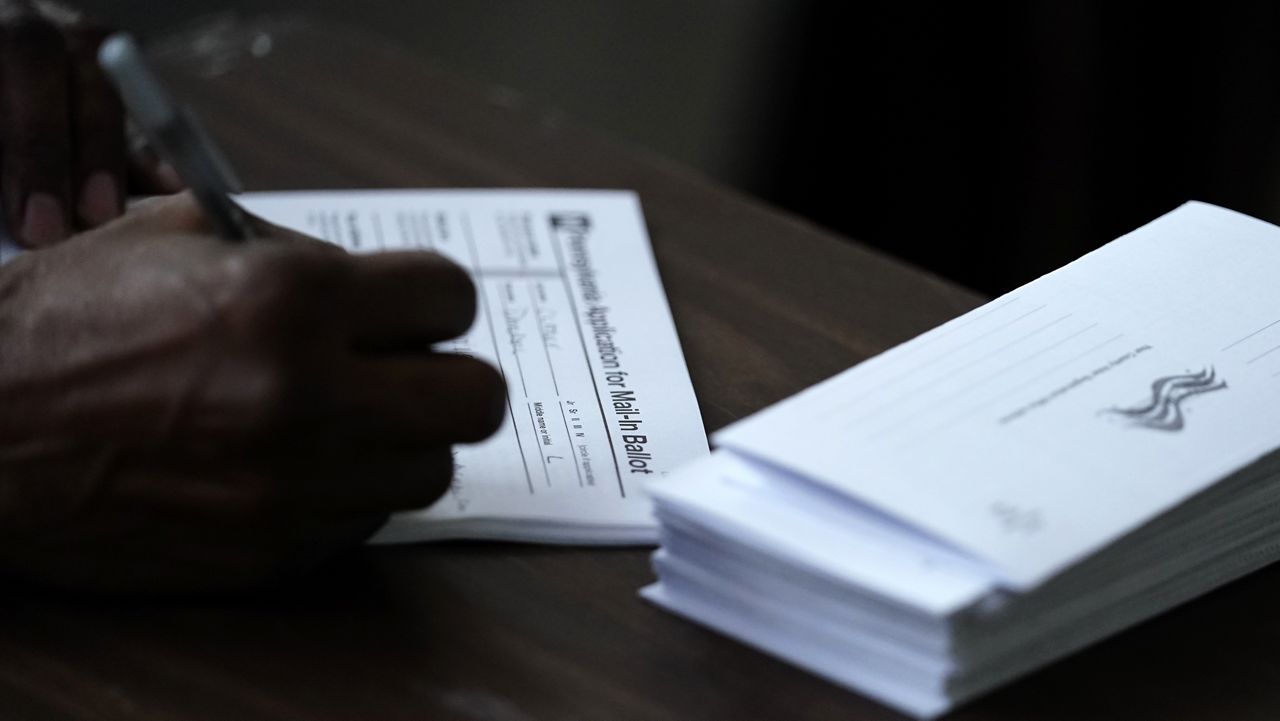HARRISBURG, Pa. — Pennsylvania's top elections official has determined that an election worker’s decision to throw out nine military ballots in Wilkes-Barre, Pennsylvania, amounted to a mistake and not “intentional fraud," despite President Trump's repeated claims at the first presidential debate Tuesday.
Workers in the elections office in Luzerne County are getting training on handling mailed-in military and overseas ballots, Secretary of State Kathy Boockvar said during an online news conference.
“The investigation is still going on, but from the initial reports we’ve been given, this was a bad error,” said Boockvar, a member of Democratic Gov. Tom Wolf’s administration. “This was not intentional fraud. So training, training, training.”
President Trump has repeatedly brought up the nine ballots as what he calls evidence of election fraud in the past week, including two mentions during Tuesday night’s presidential debate.
The president first mentioned the ballots during a radio show appearance Thursday, hours before the Trump-nominated U.S. attorney in Harrisburg, Dave Freed, put out a news release about the investigation.
“These ballots are a horror show,” Trump told Fox News Radio. “They found six ballots in an office yesterday in a garbage can. They were Trump ballots. Eight ballots in an office yesterday in a certain state and they had 'Trump' written on it, and they were thrown in a garbage can. This is what’s going to happen.”
Jonathan Marks, the Pennsylvania deputy secretary for elections, said that in some cases, military and overseas ballots arrived in Luzerne County inside envelopes that do not clearly mark them as ballots.
The usual process when those types of ballots arrive is to immediately reseal them and store them securely with other mail-in and absentee ballots to await canvassing, he said.
“So it sounds like it was confusion,” Marks said.
The Department of State is working on training for Luzerne County elections workers on what to do when they find balloting material inside an unmarked envelope.
“That’s what needs to be tightened up,” Marks said.
The unidentified worker, who officials have said was fired as a result, did not consult with others in the elections office, Marks said.
Investigators have not explained who recovered the ballots, described by Freed as “discarded,” or the process by which two of them were resealed. Freed said the other seven were all cast for Trump.
Neither Freed nor the FBI has said whether criminal charges are possible, and it’s unclear whether those nine votes will be counted.
During the debate, Trump reiterated his frequent talking point that mail-in ballots will affect the result of the election. When asked by Wallace if he’s counting on the Supreme Court to determine the outcome of the election, Trump responded: "I'm counting on them to look at the ballots, definitely."
“This is going to be a fraud like you’ve never seen," Trump added.
Wallace pushed back at the president’s claims, pointing out that there is little evidence of voter fraud from mail-in ballots.
The nature of the department's disclosure in this case was both unusual and inappropriate, experts said.
The Justice Department’s statement did not allege that any laws were broken and seemed to blame the problem on bureaucratic mistakes.
Military ballots are supposed to be securely stored, unopened, until Election Day. But election officials told investigators that the military envelopes are similar to those for mail-in ballot requests.
“The staff believed that adhering to the protocol of preserving envelopes unopened would cause them to miss such ballot requests,” the statement said.
But the Justice Department’s press release itself has left many elections and legal experts bewildered. They say it is highly unusual for U.S. attorneys to announce they’ve opened an investigation and were troubled by the fact that the DOJ revealed the votes were cast for Trump.
“This is both bizarre and disturbing — US Attorney’s Offices don’t issue reports on pending investigations — and certainly not reports so blatantly contrived to provide political ballast for a sitting President’s campaign narrative,” tweeted David Laufman, a former Justice Department official.
“It is hard to express how illegitimate the press release is. That’s the problem,” Justin Levitt, a professor at Loyola Law School, told Politico. “It is really improper for DOJ to be putting out a press release with partial fact. And it is career-endingly improper to designate the candidate for whom the votes are cast. There is no federal statute on which the identity of the preferred candidate depends.”
Richard Hasen, an election law professor at University of California at Irvine, told The Washington Post: “The Justice Department should not be a political tool, and this is a story that is going to be manipulated by the president to say his votes are being thrown out.”
The Associated Press contributed to this report.



